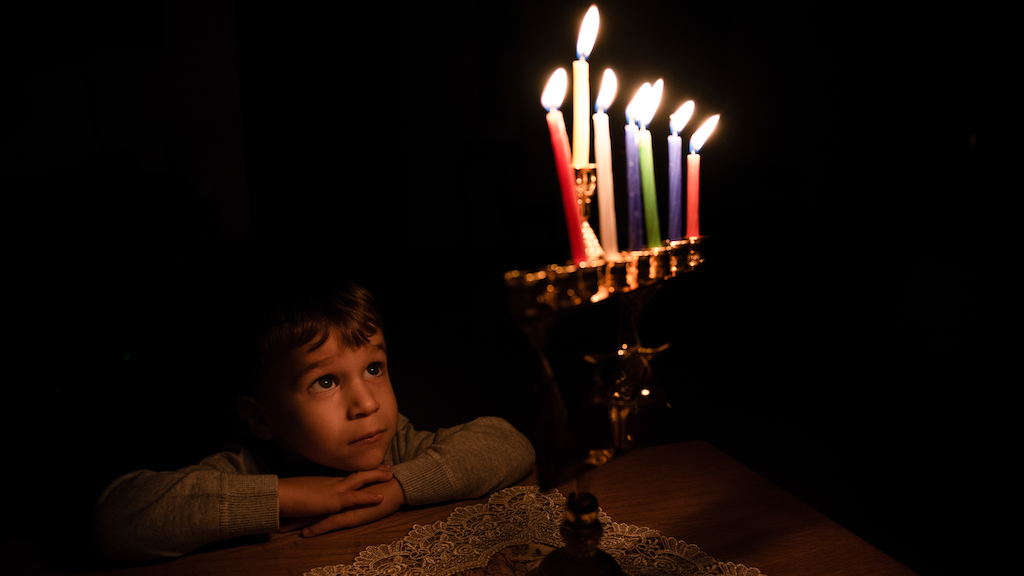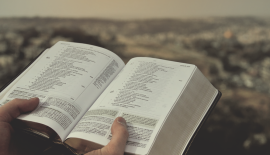Hanukkah: Light in the darkness
From 10th until 18th December 2020 the Jewish people celebrate Hanukkah, the Festival of Lights.
Hanukkah is the feast of the dedication of the Temple. It is celebrated to commemorate the day when the Jews rededicated the Temple in Jerusalem, after defeating the Syrians, in 165 BC.
The king of Syria, Antiochus IV Epiphanes, forbade anything that did not fit in with Greek culture. It was forbidden to celebrate Shabbat, circumcise and teach Torah. He profaned the Temple and brutally massacred many Jews. The Jews rebelled against this and after a few years of struggle they were able to capture the Temple in Jerusalem and the Temple could be re-dedicated. But for this re-dedication oil was needed. The menorah, the 7-armed Temple candelabrum, had to be lit. According to the story, the Jews could only find one jar of useful oil, enough to burn the menorah for one day. However, a miracle caused the menorah to burn for eight days. And it took eight days to press new, clean olive oil.
A Rabbi recently tried to explain this miracle to a modern 21st century audience as follows: “suppose the battery of your cell phone is almost empty and indicates only 10%. But by a miracle you can still keep on using your cell phone for another 8 full days.”
After the Romans destroyed the Temple in Jerusalem in the year 70 AD, Hanukkah was maintained as a Festival of Light. Hanukkah is the feast of the preservation of one’s own Jewish identity. A light is lit at home for eight days, one more every day. The candles are lit with the help of an extra light, the shamash (servant). Finally there are eight candles, plus the shamash, in the chanukiah, a nine-armed candelabrum that is only used during Hanukkah. Except on Friday evening, Jews light the chanukiah at home as soon as it is ‘night’. The candles or oil in the chanukiah should burn for at least half an hour at night.
The festival of Hanukkah has its origin in the period between the Old and the New Testament. We can read this in the books of the Maccabees. So in the time of Jesus it was already an important feast in Jewish life. In the New Testament, John 10:22–23 says, “At that time the feast of the Dedication took place at Jerusalem. It was winter, and Jesus was walking in the temple in the portico of Solomon” (NASB).
Hanukkah’s significance is that God’s light shines in times of darkness. And how powerful the forces of evil may seem, God is in control and His light of peace will shine forever. We can also read this in Zechariah’s fourth vision: the angel of the Lord roused him and Zechariah said: “I see, and behold, a lampstand all of gold with its bowl on the top of it, and its seven lamps on it with seven spouts belonging to each of the lamps which are on the top of it”. Then the prophet Zechariah asked the angel what this means, and the angel answered: “Not by might nor by power, but by My Spirit,’ says the Lord of hosts” (Zech. 4: 1-6). So the light of the Lord that shines in the darkness teaches us that our Salvation will come from the Lord and by His mighty Spirit.
As Christians we will soon celebrate Christmas, the coming of Jesus Christ the Messiah as the Light of the world. We are going to light candles in our churches and in our houses as well. The light is shining in the darkness. Like the star of Bethlehem was shining in a unique way during those days. We feel a deep connection with the Jewish people when they celebrate Hanukkah and when we celebrate Christmas. God’s light of Salvation will always shine in the dark periods of our life and of our world. Also in these uncertain times of the Covid-19 pandemic. He will prevail and He is and will be in control. No powers can ever prevent His Spirit to fill our hearts and bring His blessings. And when the new heaven and earth will come in the future, God Himself will be our light that shines forever.




